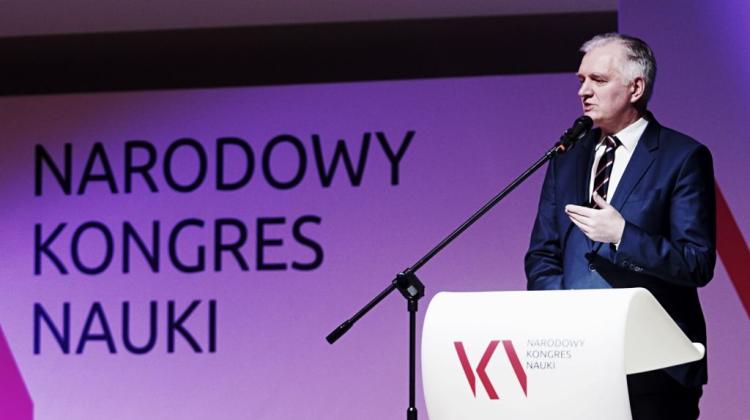Gowin: Maintaining habilitation in its present form means stagnation

Maintaining habilitation in its present form means stagnation. But its the simple removal, combined with the lower level of doctorates, will lead to a collapse in education – said Minister Jaroslaw Gowin. But there can be agreement to maintaining the status quo - he noted.
On January 26 in Katowice began another series of conferences preceding the National Congress of Science, on the key problems of Polish science. It is part of the process of developing assumptions of the new Law on Higher Education. Announced by Deputy Prime Minister and Minister of Science and Higher Education Jarosław Gowin, the project is to be presented in September 2017 in Kraków.
During the opening of the Katowice conference - devoted to the academic career path and development of young researchers - Gowin warned the entire reform would fail if appropriate solutions are not worked out to address this issue.
He pointed out that the issue of the academic career path "is accompanied by strong emotions, enormous interests, and it is the most controversial area".
Outlining the context of the problem Gowin pointed, among other things, to the clear decline in the level of doctorates in recent years, as well as the resulting question of the role of habilitation as a guarantee of high-quality scientific work. He noted that if habilitation offered such a guarantee, Polish universities would not be so far behind in the international rankings.
"The simple elimination of habilitation at decreased level of doctorates will lead to collapse. On the other hand, maintaining habilitation in its present form means stagnation" - said the Minister of Science and announced he would not be convinced to abandon changes in order to avoid collapse. "Status quo means further marginalization of Polish science and Polish universities. World science is developing so fast that we can not afford cosmetic changes" - he said.
Currently nearly 600 Polish research units have the powers to confer habilitation degree. In three years the number of associate professors (doctors with habilitation degree) has increased by a quarter. We do not know - said Gowin - whether it is the result of lower requirements, or removing the barriers to the advancement of young scientists. "If habilitation ceases to be the real sieve, should we maintain the rules under which scientific independence can be formally obtained in Poland at the age of 46 years, an average of 10 years later than in other EU countries" - wondered the Minister of Science.
He also found it necessary to discuss the institution of professorship; for example, the age for obtaining the degree steadily increases - the recent average is 57 years. According to Gowin, the topics of discussion should include maintaining the title of professor conferred by the President of the Republic of Poland and the need to attach formal privileges to the title.
"Should we keep the title of presidential professor while moving away from the associated privileges? Or - and this could be the most difficult dilemma - perhaps the crowning of a distinguished academic career should be simply hiring the scientist as a full-time professor in an open competition at the university" - wondered the science minister.
He recalled that in the current system habilitation and professorship are directly linked to the Central Committee for Degrees and Titles. The role of this committee will also be a subject for reflection during preparation of the reform of higher education - also in view of the growing number of voices in the community confirming the need to change it.
"We should answer what exactly is the uniqueness of Polish science on a European scale that only in our country the distribution of academic prestige is supervised by central authority? Is this institution actually needed, and if so, should this function be performed by a central committee or by another institution respected in the scientific community" - asked Gowin.
"Should we not, in this context - wondered Deputy Prime Minister - be guided by the excellence of scientific achievements of members of such - measured, for example, by citation rate of scientific publications".
He also stressed the importance of the problem of the diversity of career paths and promotion of academic teachers. Currently involvement in the education of students is pushed into the background - due to its limited relevance for career advancement. "We have to think how in the Polish reality this path should be different from the current system (...); so we have to prevent it from being an enclave, a museum of failed scientists" - said Gowin.
In Katowice, he maintained earlier declared intention to significantly reduce the scope of regulation and give greater autonomy to universities. "I am deeply convinced that this is a condition for normal, dynamic development of Polish universities and scientific institutions" - he declared.
During a later briefing, Minister of Science also spoke about other activities of the Ministry, related to the creation of the National Agency for Academic Exchange (NAWA). "This agency will ensure that Polish universities have as many students and faculty from abroad as possible, because science develops well in the international environment" - he explained. The bill to establish this entity is currently being consulted. Agency is expected to start operations in the autumn of this year.
PAP - Science and Scholarship in Poland
mtb/ akp/ agt/ mrt/
tr. RL
Przed dodaniem komentarza prosimy o zapoznanie z Regulaminem forum serwisu Nauka w Polsce.















